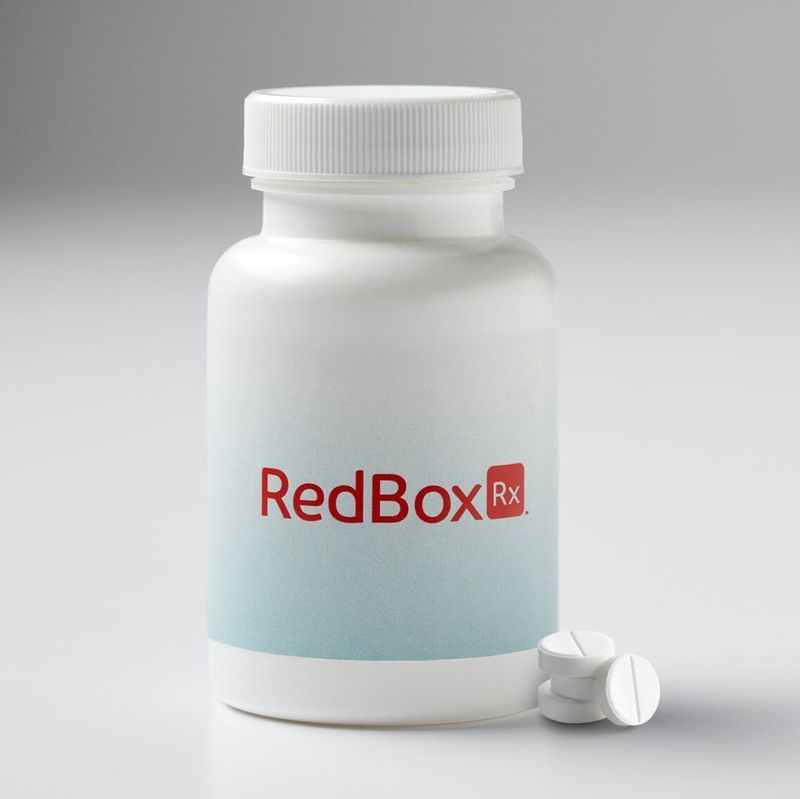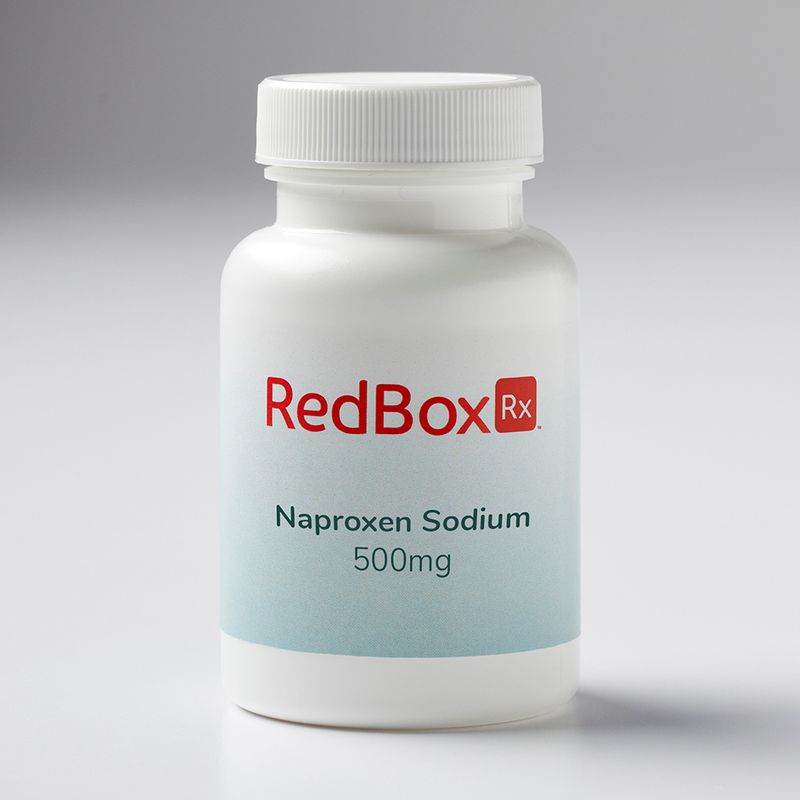Naproxen Sodium 500 mg FAQs
-
Prescription naproxen is used to relieve pain. Naproxen is in a class of medications called NSAIDs. It works by stopping the body's production of a substance that causes pain, fever, and inflammation.
-
Prescription naproxen comes as a regular tablet and typically taken twice daily for the treatment of pain caused from migraine headaches.
Follow the directions on the prescription label carefully, and ask your doctor or pharmacist to explain any part you do not understand. Take naproxen exactly as directed. Do not take more or less of it or take it more often than prescribed by your doctor or written on the package.
Stop taking naproxen and call your doctor if your symptoms get worse or you develop new or unexpected symptoms.
-
Before taking naproxen,
tell your doctor and pharmacist if you are allergic to naproxen, aspirin or other NSAIDs such as ibuprofen (Advil, Motrin) and ketoprofen, any medications for pain or fever, other medications, or any of the ingredients in naproxen products. Ask your doctor or pharmacist for a list of the ingredients.
tell your doctor and pharmacist what prescription and nonprescription medications, vitamins, nutritional supplements, and herbal products you are taking or plan to take. Be sure to mention the medications listed in the IMPORTANT WARNING section and any of the following: angiotensin-converting enzyme (ACE) inhibitors such as benazepril (Lotensin, in Lotrel), captopril, enalapril (Vasotec, in Vaseretic), fosinopril, lisinopril (in Zestoretic), moexipril (Univasc), perindopril (Aceon, in Prestalia), quinapril (Accupril, in Quinaretic), ramipril (Altace), and trandolapril (Mavik, in Tarka); angiotensin receptor blockers (ARBs) such as azilsartan (Edarbi, in Edarbyclor), candesartan (Atacand, in Atacand HCT), eprosartan (Teveten), irbesartan (Avapro, in Avalide), losartan (Cozaar, in Hyzaar), olmesartan (Benicar, in Azor, in Benicar HCT, in Tribenzor), telmisartan (Micardis, in Micardis HCT, in Twynsta), and valsartan (in Exforge HCT); beta blockers such as atenolol (Tenormin, in Tenoretic), labetalol (Trandate), metoprolol (Lopressor, Toprol XL, in Dutoprol), nadolol (Corgard, in Corzide), and propranolol (Hemangeol, Inderal, InnoPran); cholestyramine (Prevalite); diuretics ('water pills'); lithium (Lithobid), medications for diabetes; methotrexate (Otrexup, Rasuvo, Trexall); probenecid (Probalan; Col-Probenecid); and sulfa medications such as sulfamethoxazole (in Bactrim, in Septra). If you are taking the delayed-release tablets, also tell your doctor if you are taking antacids or sucralfate (Carafate). Your doctor may need to change the doses of your medication or monitor you more carefully for side effects.
do not take nonprescription naproxen with any other medication for pain unless your doctor tells you that you should.
tell your doctor if you have been told to follow a low sodium diet and if you have or have ever had any of the conditions mentioned in the IMPORTANT WARNING section or asthma, especially if you also have frequent stuffed or runny nose or nasal polyps (swelling of the inside of the nose); heart failure; swelling of the hands, arms, feet, ankles, or lower legs; anemia (red blood cells do not bring enough oxygen to all parts of the body); or liver or kidney disease.
tell your doctor if you are pregnant, plan to become pregnant; or are breast-feeding. Naproxen may harm the fetus and cause problems with delivery if it is taken around 20 weeks or later during pregnancy. Do not take naproxen around or after 20 weeks of pregnancy, unless you are told to do so by your doctor. If you become pregnant while taking naproxen, call your doctor.
talk to your doctor about the risks and benefits of taking naproxen if you are 65 years of age or older. Older adults should usually take lower doses of naproxen for short periods of time because higher doses used regularly may not be more effective and are more likely to cause serious side effects.
if you are having surgery, including dental surgery, tell the doctor or dentist that you are taking naproxen.
you should know that this medication may make you dizzy, drowsy, or depressed. Do not drive a car or operate machinery until you know how this drug affects you.
remember that alcohol can add to the drowsiness caused by this medication.
-
Unless your doctor tells you otherwise, continue your normal diet.
-
Take the missed dose as soon as you remember it. However, if it is almost time for the next dose, skip the missed dose and continue your regular dosing schedule. Do not take a double dose to make up for a missed one.
-
Naproxen may cause side effects. Tell your doctor if any of these symptoms are severe or do not go away:
constipation
diarrhea
gas
excessive thirst
headache
dizziness
lightheadedness
drowsiness
difficulty falling asleep or staying asleep
burning or tingling in the arms or legs
cold symptoms
ringing in the ears
hearing problems
Some side effects can be serious. If you experience any of the following symptoms, or those mentioned in the IMPORTANT WARNING section, call your doctor immediately. Do not take any more naproxen until you speak to your doctor:
changes in vision
feeling that the tablet is stuck in your throat
unexplained weight gain
shortness of breath or difficulty breathing
swelling in the abdomen, ankles, feet, or legs
sore throat, fever, chills, and other signs of infection
blisters
rash
skin reddening
itching
hives
swelling of the eyes, face, lips, tongue, throat, arms, or hands
difficulty breathing or swallowing
hoarseness
excessive tiredness
pain in the upper right part of the stomach
nausea
yellowing of the skin or eyes
flu-like symptoms
bruises or purple blotches under the skin
fast heartbeat
cloudy, discolored, or bloody urine
back pain
difficult or painful urination
decreased urination
loss of appetite
confusion
Naproxen may cause other side effects. Call your doctor if you have any unusual problems while taking this medication.
If you experience a serious side effect, you or your doctor may send a report to the Food and Drug Administration's (FDA) MedWatch Adverse Event Reporting program online (http://www.fda.gov/Safety/MedWatch) or by phone (1-800-332-1088).
-
Keep this medication in the container it came in, tightly closed, and out of reach of children. Store it at room temperature and away from excess heat and moisture (not in the bathroom).
It is important to keep all medication out of sight and reach of children as many containers (such as weekly pill minders and those for eye drops, creams, patches, and inhalers) are not child-resistant and young children can open them easily. To protect young children from poisoning, always lock safety caps and immediately place the medication in a safe location - one that is up and away and out of their sight and reach. http://www.upandaway.org
Unneeded medications should be disposed of in special ways to ensure that pets, children, and other people cannot consume them. However, you should not flush this medication down the toilet. Instead, the best way to dispose of your medication is through a medicine take-back program. Talk to your pharmacist or contact your local garbage/recycling department to learn about take-back programs in your community. See the FDA's Safe Disposal of Medicines website (http://goo.gl/c4Rm4p) for more information if you do not have access to a take-back program.
-
In case of overdose, call the poison control helpline at 1-800-222-1222. Information is also available online at https://www.poisonhelp.org/help. If the victim has collapsed, had a seizure, has trouble breathing, or can't be awakened, immediately call emergency services at 911.
Symptoms of overdose may include the following:
dizziness
extreme tiredness
drowsiness
stomach pain
heartburn
nausea
vomiting
slow or difficult breathing
-
Before having any laboratory test, tell your doctor and the laboratory personnel that you are taking naproxen.
If you are taking prescription naproxen, do not let anyone else take your medication. Ask your pharmacist any questions you have about refilling your prescription.
It is important for you to keep a written list of all of the prescription and nonprescription (over-the-counter) medicines you are taking, as well as any products such as vitamins, minerals, or other dietary supplements. You should bring this list with you each time you visit a doctor or if you are admitted to a hospital. It is also important information to carry with you in case of emergencies.
-
Naprosyn®
-
People who take nonsteroidal anti-inflammatory drugs (NSAIDs) (other than aspirin) such as naproxen may have a higher risk of having a heart attack or a stroke than people who do not take these medications. These events may happen without warning and may cause death. This risk may be higher for people who take NSAIDs for a long time. Do not take an NSAID such as naproxen if you have recently had a heart attack, unless directed to do so by your doctor. Tell your doctor if you or anyone in your family has or has ever had heart disease, a heart attack, or a stroke, if you smoke, and if you have or have ever had high cholesterol, high blood pressure, or diabetes. Get emergency medical help right away if you experience any of the following symptoms: chest pain, shortness of breath, weakness in one part or side of the body, or slurred speech.
If you will be undergoing a coronary artery bypass graft (CABG; a type of heart surgery), you should not take naproxen right before or right after the surgery.
NSAIDs such as naproxen may cause ulcers, bleeding, or holes in the stomach or intestine. These problems may develop at any time during treatment, may happen without warning symptoms, and may cause death. The risk may be higher for people who take NSAIDs for a long time, are older in age, have poor health, or who drink three or more alcoholic drinks per day while taking naproxen. Tell your doctor if you take any of the following medications: anticoagulants (''blood thinners'') such as warfarin (Coumadin, Jantoven); aspirin; other NSAIDs such as ibuprofen (Advil, Motrin) and ketoprofen; oral steroids such as dexamethasone, methylprednisolone (Medrol), and prednisone (Rayos); selective serotonin reuptake inhibitors (SSRIs) such as citalopram (Celexa), fluoxetine (Prozac, Sarafem, Selfemra, in Symbyax), fluvoxamine (Luvox), paroxetine (Brisdelle, Paxil, Pexeva), and sertraline (Zoloft); or serotonin norepinephrine reuptake inhibitors (SNRIs) such as desvenlafaxine (Khedezla, Pristiq), duloxetine (Cymbalta), and venlafaxine (Effexor XR). Also tell your doctor if you have or have ever had ulcers, bleeding in your stomach or intestines, or other bleeding disorders. If you experience any of the following symptoms, stop taking naproxen and call your doctor: stomach pain, heartburn, vomit that is bloody or looks like coffee grounds, blood in the stool, or black and tarry stools.
Keep all appointments with your doctor and the laboratory. Your doctor will monitor your symptoms carefully and will probably order certain tests to check your body's response to naproxen. Be sure to tell your doctor how you are feeling so that your doctor can prescribe the right amount of medication to treat your condition with the lowest risk of serious side effects.
Your doctor or pharmacist will give you the manufacturer's patient information sheet (Medication Guide) when you begin treatment with prescription naproxen and each time you refill your prescription. Read the information carefully and ask your doctor or pharmacist if you have any questions. You can also visit the Food and Drug Administration (FDA) website (http://www.fda.gov/Drugs/DrugSafety/ucm085729.htm) or the manufacturer's website to obtain the Medication Guide.
-
We offer a variety of prescription medication options for migraines and headaches including:

Affordable migraine and headache treatment online.
Whether you are looking for preventative or acute treatment of migraines and headaches, RedBox Rx offers FDA-approved prescription medications to get you feeling like yourself again. Your first step towards relief is to start an online consultation with one of our experienced, licensed medical providers.
- No membership or subscription fees.
- Low-cost $25 telehealth consult with a licensed medical provider.
- Naproxen sodium 500 mg for $30 per treatment (30 tablets).
- Confidential, private and secure.
- Free standard shipping or expedited/overnight available.
Sorry, we’re closed for today. Our U.S. licensed medical providers are available daily 7 a.m. to 9 p.m. CST via live video visit. We look forward to serving you soon. Email us anytime at [email protected].
How RedBox Rx Works
What Our Patients Are Saying
-
“
They made service quick and easy to use. The health information that you complete wasn’t horrible and they did request recent lab work. I completed the information Monday and received my migraine medication on Thurs!
Heather S.
-
“
First time I used RedBox Rx and completely satisfied! I filled out the online consultation which was very thorough and that impressed me. Then less than 24 hours later I had an approval from a doctor for migraine medicine. Having no insurance at this time, this was easy and safe. I will use RedBox Rx again.
Constance W.
-
“
I can't believe the quality of care, not to mention how easy the site is to use! It is by far the best site I've found so far! Thank you RedBox Rx.
Laura K.

Get naproxen sodium 500 mg prescribed online.
Take a 5-minute online assessment, then one of our experienced, licensed medical providers will review and determine whether naproxen sodium 500 mg or another medication is right for you.
Sorry, we’re closed for today. Our U.S. licensed medical providers are available daily 7 a.m. to 9 p.m. CST via live video visit. We look forward to serving you soon. Email us anytime at [email protected].





